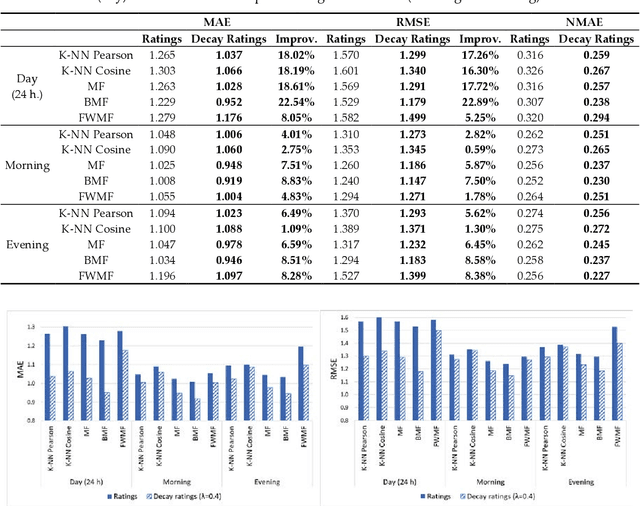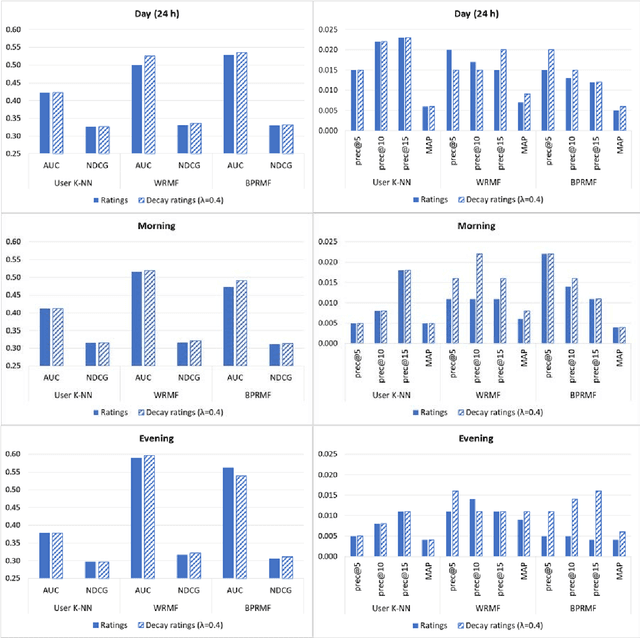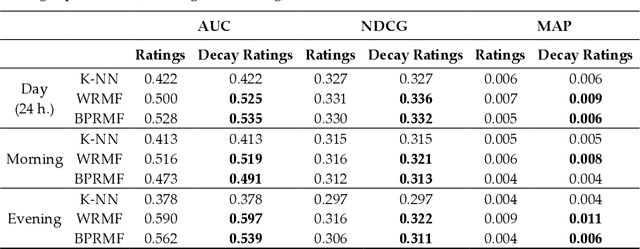Diego Sánchez-Moreno
Dynamic inference of user context through social tag embedding for music recommendation
Sep 23, 2021



Abstract:Music listening preferences at a given time depend on a wide range of contextual factors, such as user emotional state, location and activity at listening time, the day of the week, the time of the day, etc. It is therefore of great importance to take them into account when recommending music. However, it is very difficult to develop context-aware recommender systems that consider these factors, both because of the difficulty of detecting some of them, such as emotional state, and because of the drawbacks derived from the inclusion of many factors, such as sparsity problems in contextual pre-filtering. This work involves the proposal of a method for the detection of the user contextual state when listening to music based on the social tags of music items. The intrinsic characteristics of social tagging that allow for the description of items in multiple dimensions can be exploited to capture many contextual dimensions in the user listening sessions. The embeddings of the tags of the first items played in each session are used to represent the context of that session. Recommendations are then generated based on both user preferences and the similarity of the items computed from tag embeddings. Social tags have been used extensively in many recommender systems, however, to our knowledge, they have been hardly used to dynamically infer contextual states.
Time-Aware Music Recommender Systems: Modeling the Evolution of Implicit User Preferences and User Listening Habits in A Collaborative Filtering Approach
Aug 26, 2020



Abstract:Online streaming services have become the most popular way of listening to music. The majority of these services are endowed with recommendation mechanisms that help users to discover songs and artists that may interest them from the vast amount of music available. However, many are not reliable as they may not take into account contextual aspects or the ever-evolving user behavior. Therefore, it is necessary to develop systems that consider these aspects. In the field of music, time is one of the most important factors influencing user preferences and managing its effects, and is the motivation behind the work presented in this paper. Here, the temporal information regarding when songs are played is examined. The purpose is to model both the evolution of user preferences in the form of evolving implicit ratings and user listening behavior. In the collaborative filtering method proposed in this work, daily listening habits are captured in order to characterize users and provide them with more reliable recommendations. The results of the validation prove that this approach outperforms other methods in generating both context-aware and context-free recommendations
A session-based song recommendation approach involving user characterization along the play power-law distribution
Apr 25, 2020



Abstract:In recent years, streaming music platforms have become very popular mainly due to the huge number of songs these systems make available to users. This enormous availability means that recommendation mechanisms that help users to select the music they like need to be incorporated. However, developing reliable recommender systems in the music field involves dealing with many problems, some of which are generic and widely studied in the literature, while others are specific to this application domain and are therefore less well-known. This work is focused on two important issues that have not received much attention: managing gray-sheep users and obtaining implicit ratings. The first one is usually addressed by resorting to content information that is often difficult to obtain. The other drawback is related to the sparsity problem that arises when there are obstacles to gather explicit ratings. In this work, the referred shortcomings are addressed by means of a recommendation approach based on the users' streaming sessions. The method is aimed at managing the well-known power-law probability distribution representing the listening behavior of users. This proposal improves the recommendation reliability of collaborative filtering methods while reducing the complexity of the procedures used so far to deal with the gray-sheep problem.
 Add to Chrome
Add to Chrome Add to Firefox
Add to Firefox Add to Edge
Add to Edge